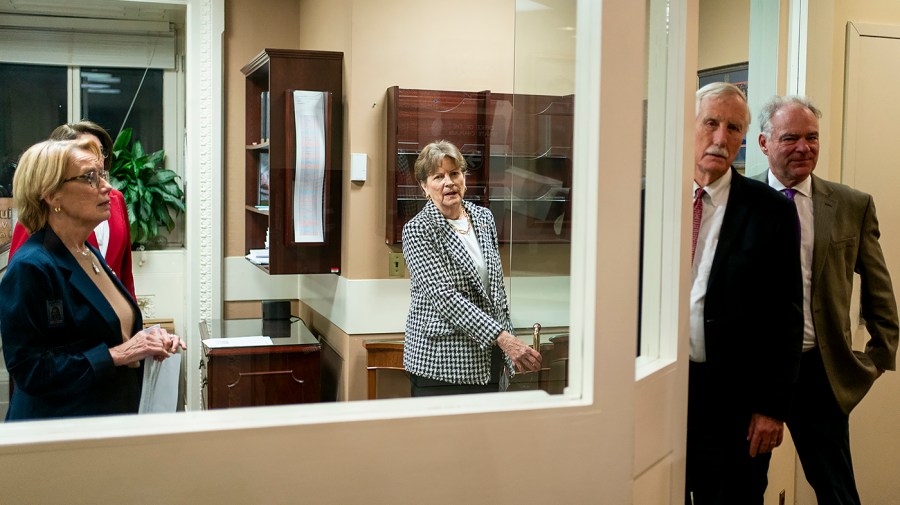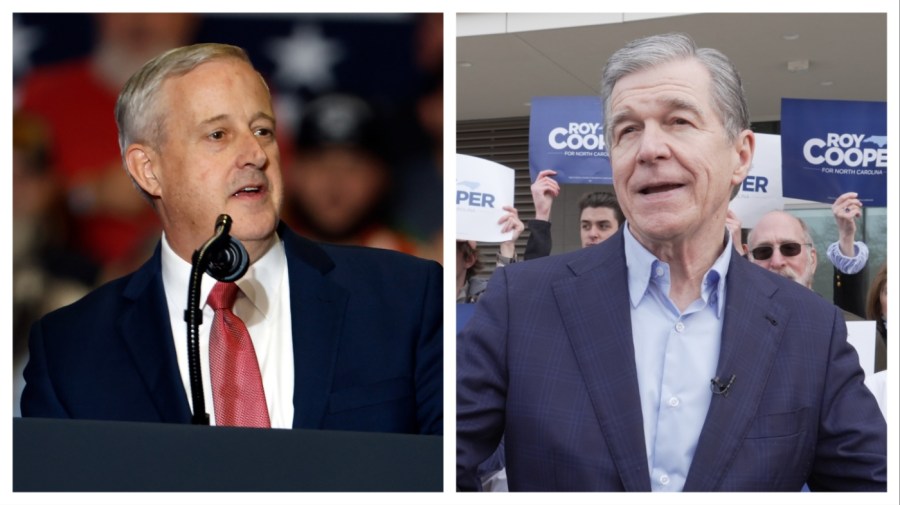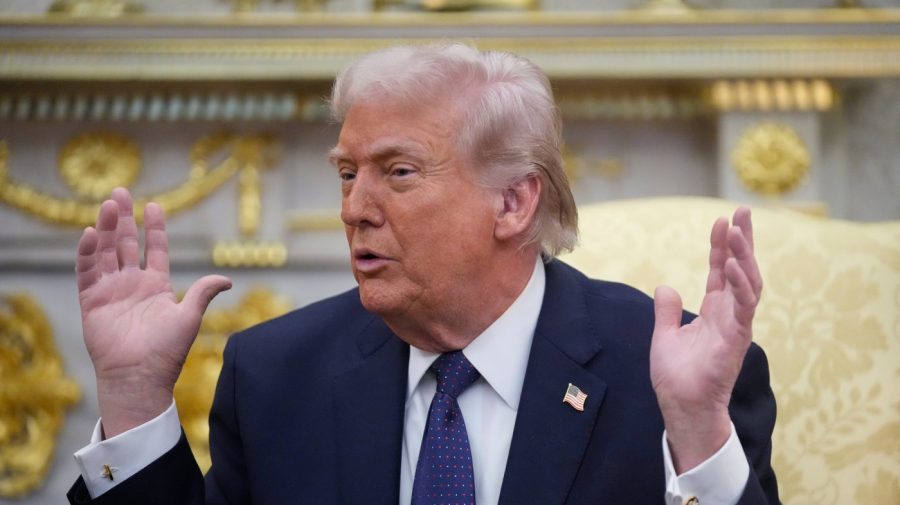
Senator Tim Kaine (Va.), who served as Hillary Clinton’s running mate nearly a decade ago when she lost the presidency to Donald Trump, was the eighth Democratic senator to support a centrist compromise that the Senate is set to approve on Monday that is likely to soon end the longest shutdown in U.S. history.
Kaine’s top priority was protecting the thousands of federal workers whom the Trump administration was trying to fire during the government shutdown.
To prevail over Kaine, Senate Majority Leader John Thune (R-D.) needed to gain White House support on language affecting federal employees.
“We spent all day working on that language,” Kaine said, referring to Sunday’s frantic talks. “We reached the meeting of the minds around 5:45 pm on Sunday afternoon.”
By then, Kaine said he had no agreement with the White House on retaining thousands of federal employees targeted by reductions in force (RIF). Just before Sunday’s more than two-hour Democratic caucus meeting, where he announced his support for the deal — to the dismay of many in his party who wanted the fight to continue — Kaine winced at those assurances.
“We had a caucus meeting at 6 [p.m.] … I came in with a sad face and they were like, ‘What’s going on.’ I said, ‘We found the language we needed,'” he said.
The agreement to end the shutdown must be approved by the House and signed by President Trump, but those hurdles are likely to be cleared later this week, allowing the government to reopen.
Democrats are likely to struggle for months over decisions made by seven Democrats and independent Senator Angus King (Maine), who joined with Democrats to support a compromise that does nothing to increase subsidies under the Affordable Care Act (ACA) that is set to expire at the end of the year.
Liberal groups have already committed to primary Democrats who will support the bill, and it is possible that very few House Democrats, if any, will support it.
Thune promised a Senate vote on the issue of health care subsidies as part of the package, but there is no guarantee the extension will pass in the Senate or get a vote in the House.
Still, King and the Democrats who voted to reopen the government said they believed they made the best call for the country.
King said that as the shutdown dragged on for weeks, it became clear that Republicans would not agree to increase Obamacare subsidies.
“Republicans have always taken the position that as long as the government is shut down, we’re not going to have a conversation about the ACA. Maybe in the first week we weren’t so convinced that they really were. By the second week, third, fourth, fifth, sixth week, it became clear that [Democratic] The strategy was not working. They weren’t going to come back and say we want to do something on the ACA,” King explained.
Getting Thune to agree to a vote on increasing subsidies was a “big deal” for Maine senators.
“Otherwise, Democrats have no way to get a bill through the House. It has to go through the majority leader. When he says, ‘I guarantee you a vote on the bill you write on the date you choose,’ that’s a big deal,” King said.
Abandoning Schumer’s strategy
In supporting the deal, Democrats abandoned Senate Minority Leader Chuck Schumer (D-N.Y.)’s strategy of keeping the government shut down in order to secure major health care concessions.
It came together in the final hours of high-stakes negotiations.
Kaine said there was “a lot of resistance” from the White House to reinstatement of workers laid off during the shutdown, but Republicans ultimately accepted the provisions he wanted in the bill because “they needed my vote.”
Other key players in the impasse – such as Toby Hawk, a senior air traffic controller at O’Hare International Airport in Chicago – helped persuade Senate Democratic Whip Dick Durbin (Ill.) to vote for the package.
Durbin and other Democrats said they were concerned about the pain the shutdown would cause.
Durbin said, “Part of it … was my friend Toby Hawk who is the head of air traffic controllers in the tower near O’Hare. I’ve known him since the shutdown in Trump’s first term.” “I had a long conversation with them just a few days ago. I’m really concerned that we’re giving these air traffic controllers six 10-hour shifts every week.
“Some of them have gone to other leaders,” he said. [air traffic control] Leave was sought from Tower so that they could get jobs to earn some cash money to pay for their families. When these controllers are keeping airplanes safe in the air, I don’t want them worrying about their salaries and problems at home.
Durbin was also influenced by a strong statement issued by American Federation of Government Employees President Everett Kelly, who on October 27 urged Democrats to pass a clean continuing resolution to reopen the government.
“That was part of it,” Durbin said of pressure from the largest federal employee union.
Durbin told Senate Democratic colleagues in a closed-door meeting that he would vote to reopen the government because it is “the right thing to do.”
Senate Appropriations Committee Chairwoman Senator Susan Collins (R-Maine) used her longtime relationship with fellow appropriators Senator Jeanne Shaheen (D-N.H.) to work on the final version of the minibus package to fund military construction, Veterans Affairs, the Department of Agriculture and the Legislative Branch.
He and Shaheen also negotiated a minibus-related continuation proposal to fund the rest of the government until January 30.
Shaheen, who will retire at the end of next year, was key in bringing her home-state colleague Senator Maggie Hassan (D-N.H.) into the negotiating group.
All of the Democrats supporting the compromise are senators who are either retiring, or who won’t face voters again until 2028 or 2030, as in Shaheen and Durbin’s cases. In addition to Hassan, Shaheen and King, the group also includes Senators Jacky Rosen (D-Nev.), Catherine Cortez Masto (D-Nev.) and John Fetterman (D-Pa.).
Hassan and King worked with Thune to get the Senate GOP leader to promise a vote by mid-December on increasing health care subsidies.
“My role was to try to convince Leader Thune that this was a practical path forward,” King told The Hill.
He said it is a “fair question” whether the legislation could pass in the Senate or receive a vote in the House, but he argued that supporters of increasing the subsidies now have “a better chance to deal with the ACA issue.”
Snap’s role in battle
Hassan and other Democrats who voted for the deal highlighted that it would fund the Supplemental Nutrition Assistance Program (SNAP) and provide pay checks to law enforcement officers, air traffic controllers and other federal employees who were forced to work during the shutdown.
Hassan said she has heard “over and over again” from New Hampshire families about “how deeply they are hurting because of the government shutdown, which has been made worse by a president who illegally and repeatedly decided to cut off help for families trying to afford groceries.”
If another shutdown occurs, the new agreement would prevent Trump from using the expiration of SNAP benefits for leverage against Democrats, as he did over the past 10 days.
“The SNAP issue is extremely important and we no longer have it just for CR [continuing resolution]We’ve got it at strong funding levels for the rest of the year,” Cain said.
Democrats supporting the deal also said they were feeling the pressure of seeing Capitol Police officers, Senate staff and Capitol maintenance workers grapple with the burden of working for weeks without pay.
“Multiple Capitol Police officers looked me in the eye … and said, ‘Thank you,'” Cain said. “I’ll have a lot of federal employees going back to work and they’re getting their pay and they can stay over the holidays.”












